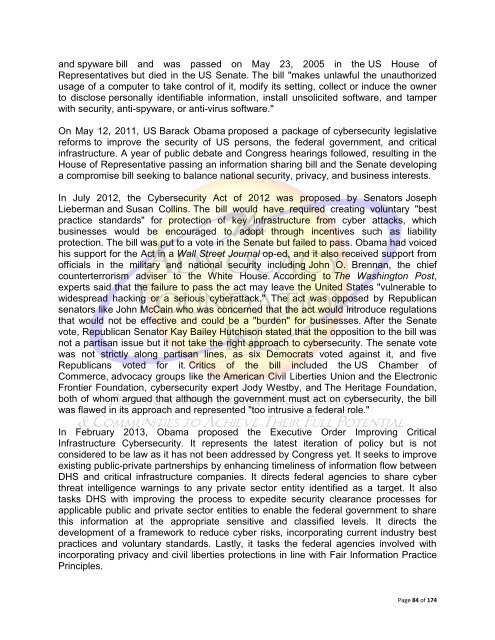International Cyber Terrorism
International Cyber Terrorism
International Cyber Terrorism
- No tags were found...
Create successful ePaper yourself
Turn your PDF publications into a flip-book with our unique Google optimized e-Paper software.
and spyware bill and was passed on May 23, 2005 in the US House of<br />
Representatives but died in the US Senate. The bill "makes unlawful the unauthorized<br />
usage of a computer to take control of it, modify its setting, collect or induce the owner<br />
to disclose personally identifiable information, install unsolicited software, and tamper<br />
with security, anti-spyware, or anti-virus software."<br />
On May 12, 2011, US Barack Obama proposed a package of cybersecurity legislative<br />
reforms to improve the security of US persons, the federal government, and critical<br />
infrastructure. A year of public debate and Congress hearings followed, resulting in the<br />
House of Representative passing an information sharing bill and the Senate developing<br />
a compromise bill seeking to balance national security, privacy, and business interests.<br />
In July 2012, the <strong>Cyber</strong>security Act of 2012 was proposed by Senators Joseph<br />
Lieberman and Susan Collins. The bill would have required creating voluntary "best<br />
practice standards" for protection of key infrastructure from cyber attacks, which<br />
businesses would be encouraged to adopt through incentives such as liability<br />
protection. The bill was put to a vote in the Senate but failed to pass. Obama had voiced<br />
his support for the Act in a Wall Street Journal op-ed, and it also received support from<br />
officials in the military and national security including John O. Brennan, the chief<br />
counterterrorism adviser to the White House. According to The Washington Post,<br />
experts said that the failure to pass the act may leave the United States "vulnerable to<br />
widespread hacking or a serious cyberattack." The act was opposed by Republican<br />
senators like John McCain who was concerned that the act would introduce regulations<br />
that would not be effective and could be a "burden" for businesses. After the Senate<br />
vote, Republican Senator Kay Bailey Hutchison stated that the opposition to the bill was<br />
not a partisan issue but it not take the right approach to cybersecurity. The senate vote<br />
was not strictly along partisan lines, as six Democrats voted against it, and five<br />
Republicans voted for it. Critics of the bill included the US Chamber of<br />
Commerce, advocacy groups like the American Civil Liberties Union and the Electronic<br />
Frontier Foundation, cybersecurity expert Jody Westby, and The Heritage Foundation,<br />
both of whom argued that although the government must act on cybersecurity, the bill<br />
was flawed in its approach and represented "too intrusive a federal role."<br />
In February 2013, Obama proposed the Executive Order Improving Critical<br />
Infrastructure <strong>Cyber</strong>security. It represents the latest iteration of policy but is not<br />
considered to be law as it has not been addressed by Congress yet. It seeks to improve<br />
existing public-private partnerships by enhancing timeliness of information flow between<br />
DHS and critical infrastructure companies. It directs federal agencies to share cyber<br />
threat intelligence warnings to any private sector entity identified as a target. It also<br />
tasks DHS with improving the process to expedite security clearance processes for<br />
applicable public and private sector entities to enable the federal government to share<br />
this information at the appropriate sensitive and classified levels. It directs the<br />
development of a framework to reduce cyber risks, incorporating current industry best<br />
practices and voluntary standards. Lastly, it tasks the federal agencies involved with<br />
incorporating privacy and civil liberties protections in line with Fair Information Practice<br />
Principles.<br />
Page 84 of 174
















